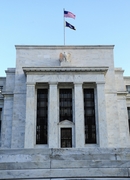 Virginia Postrel’s column in The Atlantic this month makes for fascinating reading. In it, she highlight academic research that shows that the so-called ‘great moderation’ was not down purely to central banks or government policies, as central bankers and politicians wanted to think, but “changes in business practices that occurred for competitive reasons having nothing to do with macroeconomic goals.” As Postrel puts it, “The Great Moderation looks a lot like the staid 1950s, with better inventory management and more-flexible employment contracts.”
Virginia Postrel’s column in The Atlantic this month makes for fascinating reading. In it, she highlight academic research that shows that the so-called ‘great moderation’ was not down purely to central banks or government policies, as central bankers and politicians wanted to think, but “changes in business practices that occurred for competitive reasons having nothing to do with macroeconomic goals.” As Postrel puts it, “The Great Moderation looks a lot like the staid 1950s, with better inventory management and more-flexible employment contracts.”
The Federal Reserve then became a huge part of the problem with its aggressive cutting of interest rates in 2001. Postrel points to research from John B, Taylor, of Taylor rules fame, that shows that there were approximately a quarter of a million more housing starts a year than there would have been if the Fed had kept to its normal procedure for determining interest rates.
Taylor’s critique of the handling of the financial crisis is extremely persuasive:
“To make matters worse, Taylor argues, once the financial crisis began in August 2007, policy makers and many Wall Street traders misdiagnosed the problem as a shortage of liquidity—something the Fed could address by making it easier for banks to borrow from the government. But the problem was really so-called counterparty risk: financial institutions couldn’t trust the securities they were buying from and selling to each other. To compensate for this risk, banks charged each other much higher interest rates.
“This was not a situation like the Great Depression where just printing money or providing liquidity was the solution; rather it was due to fundamental problems in the financial sector,” Taylor writes in a survey of his published research on the crisis. The only way to fix the problem is to clean up the banks’ balance sheets, bringing in more capital to make them stronger and marking down bad loans (reducing their principal amounts) to make them more trustworthy.
That prescription is more painful, and much less politically palatable, than slashing interest rates or ramping up federal spending. But the need for restructuring is what makes serious financial crises different from ordinary recessions—and why the recessions those crises set off tend to last an especially long time. The longer the restructuring is postponed, the longer the recession will linger, as Japan learned during its “lost decade” of the 1990s.”
The more one reads about this crisis, the more apparent it becomes that few of the fixes that have been tried have much chance of working until the mess in the financial sector has been cleared up. It does seem bizarre to me that we haven’t yet bitten the bullet and set up a bad bank. Indeed, the longer it is left the more difficult is to do because popular outrage is—understandably—increasing by the day.







Comments